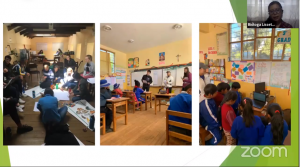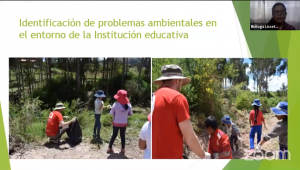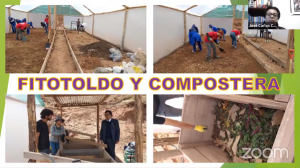Embark on a journey through Barcelona's captivating art and architecture. Explore the visionary works of Gaudí, Picasso, and more, set against the city's stunning landscapes.
GVI
Posted: July 5, 2024

Posted: November 23, 2020
On October 26th, Centro Bartolomé de las Casas and GVI held the 2nd online event focus on environmental education in the school Mateo Pumacahua in the rural community of Pongobamba in Chinchero, Cusco. We want to drive attention to two years of work in which we have taught environmental education workshops and build green infrastructure for students.
Our Program Manager, Karol Hermoza, gave the welcoming words. She discussed how the GVI’s pillars align with the objectives of environmental education in the Mateo Pumacahua school. As well, she mentioned how the intercultural exchange between international volunteers and local students has proven to be a unique educational experience. Although GVI is not currently present in the field due to the coronavirus pandemic, she reinforced the commitment to come back to the rural communities in the next year.

Our field staff, Lisette Huamán, gave a presentation about GVI’s work in the Mateo Pumacahua school. She started explaining how we have focused on the national plans of environmental education and how we have followed the current objectives to fight climate change. In 2018, local students and GVI volunteers started the work by identifying the issues in the communities in terms of environmental conservation. As well, we saw the commitment of teachers and parents who together supported the students’ vision. The environmental activities are the following: cleaning sessions around the Piuray lagoon, reforestation efforts inside the school and around the community, and environmental workshops for all grades. In 2019 we expanded these workshops to other schools in the Chinchero district. Besides, we should address two green infrastructure projects, the ‘Casa Caliente’ in which GVI volunteers helped to adapt a classroom so it can have a natural heating system. The other project was a greenhouse and terraces that will help students with their studies of agriculture and learn more about how their families work the land in the highlands of Cusco. A plan for 2020 was the implementation of the Globe program that would have trained students in measuring different meteorological phenomenons. Hopefully, this project will continue by 2021.

On the other hand, we had the participation of the school’s principal, José Carlos Cusi Timpo. He gave a perspective as a teacher and details about how the Mateo Pumacahua school is becoming a reference to environmental education within the province. The school has an environmental plan, and the work between GVI and CBC has helped the objectives of climate change and eco-efficiency. One of the highlights is the ‘Casa Caliente’ project, which the school took to an event organized by the Ministry of Education. Students from the last year of the high school explained the project from an educational perspective. They won a prize in the category of engineer and technology. The greenhouse project continues to be a pillar within the education for students. We have continued with a compost area, so the production is completely organic. As well, the reforestation efforts will be seen in the long run when the trees grow and will give shadow to students and the community. The Mateo Pumacahua’s principal is a firm believer in ‘learning by doing’, which means that these projects have taught students beyond what they could have gained from a regular class. Students have a better knowledge of environmental conservation and have better perspectives for themselves and their community.

Finally, Juan Victor Béjar from CBC gave the final comments in order to close the event. He discussed how the articulation between the territory, the community’s vision, and the students bring successful outcomes like the ones seen in the Mateo Pumacahua school. The effects of climate change and the lower levels of water urge the younger generations to take part in environmental conservation within their own space. It has been a learning space that could drive us for even more activities in the future, like waste management, clean technology, among others.
As the pandemic has put more restraints on rural communities, it’s relevant not to forget that the environment is essential for future generations. Therefore, from the GVI team, we continue to partner up with local associations that have a clear view of this scenario and have the right expertise to put us forward on these issues.
Embark on a journey through Barcelona's captivating art and architecture. Explore the visionary works of Gaudí, Picasso, and more, set against the city's stunning landscapes.
GVI
Posted: July 5, 2024